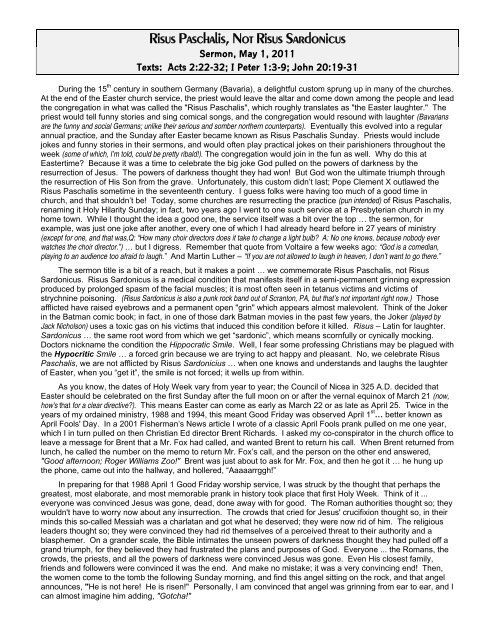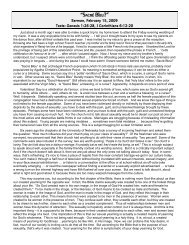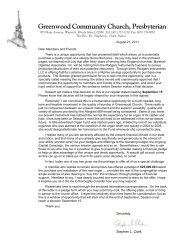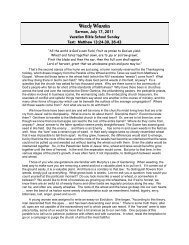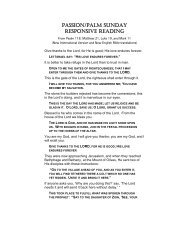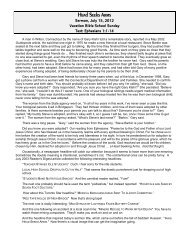Risus Paschalis, not Risus Sardonicus - Greenwood Community ...
Risus Paschalis, not Risus Sardonicus - Greenwood Community ...
Risus Paschalis, not Risus Sardonicus - Greenwood Community ...
- No tags were found...
You also want an ePaper? Increase the reach of your titles
YUMPU automatically turns print PDFs into web optimized ePapers that Google loves.
<strong>Risus</strong> <strong>Paschalis</strong>, Not <strong>Risus</strong> <strong>Sardonicus</strong><br />
Sermon, May 1, 2011<br />
Texts: Acts 2:22-32; I Peter 1:3-9; John 20:19-31<br />
During the 15 th century in southern Germany (Bavaria), a delightful custom sprung up in many of the churches.<br />
At the end of the Easter church service, the priest would leave the altar and come down among the people and lead<br />
the congregation in what was called the "<strong>Risus</strong> <strong>Paschalis</strong>", which roughly translates as "the Easter laughter." The<br />
priest would tell funny stories and sing comical songs, and the congregation would resound with laughter (Bavarians<br />
are the funny and social Germans; unlike their serious and somber northern counterparts). Eventually this evolved into a regular<br />
annual practice, and the Sunday after Easter became known as <strong>Risus</strong> <strong>Paschalis</strong> Sunday. Priests would include<br />
jokes and funny stories in their sermons, and would often play practical jokes on their parishioners throughout the<br />
week (some of which, I’m told, could be pretty ribald!). The congregation would join in the fun as well. Why do this at<br />
Eastertime Because it was a time to celebrate the big joke God pulled on the powers of darkness by the<br />
resurrection of Jesus. The powers of darkness thought they had won! But God won the ultimate triumph through<br />
the resurrection of His Son from the grave. Unfortunately, this custom didn’t last; Pope Clement X outlawed the<br />
<strong>Risus</strong> <strong>Paschalis</strong> sometime in the seventeenth century. I guess folks were having too much of a good time in<br />
church, and that shouldn’t be! Today, some churches are resurrecting the practice (pun intended) of <strong>Risus</strong> <strong>Paschalis</strong>,<br />
renaming it Holy Hilarity Sunday; in fact, two years ago I went to one such service at a Presbyterian church in my<br />
home town. While I thought the idea a good one, the service itself was a bit over the top … the sermon, for<br />
example, was just one joke after a<strong>not</strong>her, every one of which I had already heard before in 27 years of ministry<br />
(except for one, and that was,Q: “How many choir directors does it take to change a light bulb A: No one knows, because nobody ever<br />
watches the choir director.”) … but I digress. Remember that quote from Voltaire a few weeks ago: “God is a comedian,<br />
playing to an audience too afraid to laugh.” And Martin Luther – “If you are <strong>not</strong> allowed to laugh in heaven, I don’t want to go there.”<br />
The sermon title is a bit of a reach, but it makes a point … we commemorate <strong>Risus</strong> <strong>Paschalis</strong>, <strong>not</strong> <strong>Risus</strong><br />
<strong>Sardonicus</strong>. <strong>Risus</strong> <strong>Sardonicus</strong> is a medical condition that manifests itself in a semi-permanent grinning expression<br />
produced by prolonged spasm of the facial muscles; it is most often seen in tetanus victims and victims of<br />
strychnine poisoning. (<strong>Risus</strong> <strong>Sardonicus</strong> is also a punk rock band out of Scranton, PA, but that’s <strong>not</strong> important right now.) Those<br />
afflicted have raised eyebrows and a permanent open "grin" which appears almost malevolent. Think of the Joker<br />
in the Batman comic book; in fact, in one of those dark Batman movies in the past few years, the Joker (played by<br />
Jack Nicholson) uses a toxic gas on his victims that induced this condition before it killed. <strong>Risus</strong> – Latin for laughter.<br />
<strong>Sardonicus</strong> … the same root word from which we get “sardonic”, which means scornfully or cynically mocking.<br />
Doctors nickname the condition the Hippocratic Smile. Well, I fear some professing Christians may be plagued with<br />
the Hypocritic Smile … a forced grin because we are trying to act happy and pleasant. No, we celebrate <strong>Risus</strong><br />
<strong>Paschalis</strong>, we are <strong>not</strong> afflicted by <strong>Risus</strong> Sardonicius … when one knows and understands and laughs the laughter<br />
of Easter, when you “get it”, the smile is <strong>not</strong> forced; it wells up from within.<br />
As you know, the dates of Holy Week vary from year to year; the Council of Nicea in 325 A.D. decided that<br />
Easter should be celebrated on the first Sunday after the full moon on or after the vernal equinox of March 21 (now,<br />
how's that for a clear directive). This means Easter can come as early as March 22 or as late as April 25. Twice in the<br />
years of my ordained ministry, 1988 and 1994, this meant Good Friday was observed April 1 st … better known as<br />
April Fools' Day. In a 2001 Fisherman’s News article I wrote of a classic April Fools prank pulled on me one year,<br />
which I in turn pulled on then Christian Ed director Brent Richards. I asked my co-conspirator in the church office to<br />
leave a message for Brent that a Mr. Fox had called, and wanted Brent to return his call. When Brent returned from<br />
lunch, he called the number on the memo to return Mr. Fox’s call, and the person on the other end answered,<br />
"Good afternoon; Roger Williams Zoo!" Brent was just about to ask for Mr. Fox, and then he got it … he hung up<br />
the phone, came out into the hallway, and hollered, “Aaaaarrggh!”<br />
In preparing for that 1988 April 1 Good Friday worship service, I was struck by the thought that perhaps the<br />
greatest, most elaborate, and most memorable prank in history took place that first Holy Week. Think of it ...<br />
everyone was convinced Jesus was gone, dead, done away with for good. The Roman authorities thought so; they<br />
wouldn't have to worry now about any insurrection. The crowds that cried for Jesus' crucifixion thought so, in their<br />
minds this so-called Messiah was a charlatan and got what he deserved; they were now rid of him. The religious<br />
leaders thought so; they were convinced they had rid themselves of a perceived threat to their authority and a<br />
blasphemer. On a grander scale, the Bible intimates the unseen powers of darkness thought they had pulled off a<br />
grand triumph, for they believed they had frustrated the plans and purposes of God. Everyone ... the Romans, the<br />
crowds, the priests, and all the powers of darkness were convinced Jesus was gone. Even His closest family,<br />
friends and followers were convinced it was the end. And make no mistake; it was a very convincing end! Then,<br />
the women come to the tomb the following Sunday morning, and find this angel sitting on the rock, and that angel<br />
announces, "He is <strong>not</strong> here! He is risen!" Personally, I am convinced that angel was grinning from ear to ear, and I<br />
can almost imagine him adding, "Gotcha!"
Now, don’t get me wrong; I do <strong>not</strong> think of the death and resurrection of Jesus as some sort of joke. I don't<br />
make light of the fact that the crucifixion was indeed a terrible event. Jesus paid a harsh price for our salvation, and<br />
it was most difficult for those who loved Him to witness the horror. Their master had been humiliated, tortured and<br />
killed. All their hopes and joys seem buried in His grave, their cause seemed lost, they were frightened for their<br />
lives, they were trying to figure out what they were going to do now, they’re hiding and huddling together behind<br />
locked doors ... then the startling, surprising, shocking visit from Jesus appearing right there in their midst: He<br />
says, “Shalom”, which is the typical Jewish greeting of the day, and I’m sure He had a broad grin on His face.<br />
“Shalom” may be the rough cultural equivalent of our “Hi There” (or, even more colloquially, “Wassup”)… and we are told<br />
the disciples who were there were overjoyed, delighted! The surprise was complete! They got it! And the<br />
disciple’s joy just bursts out of the lectionary readings this morning; as Peter puts it, they are filled with an<br />
inexpressible and glorious joy. Can God really do this Can the whole course and pattern of the universe, life to<br />
death, be overturned so that now it reads, life, death … life Can’t you just see the radiant smiles, the “risus<br />
paschalis” exploding across the faces of these disciples, engulfing the room with joy When our mental faculties<br />
prove inadequate to a situation, when the irony and surprise is so unexpected, when the apparent contradiction to<br />
all we have known and believed is so blatant, then laughter just takes over.<br />
All of the elements of a classic prank are on display here. A good prank always takes long and careful<br />
planning. Who would've guessed what God was up to But this had been the divine plan for a loo-ong time. The<br />
prophets spoke of it, and Jesus even told His disciples what He was going to do … but apparently they didn't<br />
understand and/comprehend. Also, in a good prank surprise is complete and total. Well, put yourselves in the<br />
place of any of those present. Imagine their surprise, imagine their shock, imagine their relief, imagine their<br />
amazement, imagine their joy! And imagine the consternation of Jesus’ enemies! Third, the more solemn the<br />
target, the more satisfaction the prank brings. What more solemn target than death itself You know, when the<br />
Bible says, "O Death, where is your victory Where is your sting" that is best understood as a taunt! God convincingly<br />
demonstrated His ultimate power over the forces of darkness. He is in control. The forces of darkness have done<br />
their worst, and God uses even that to affect His greatest act. Fourth, a good prank gives great satisfaction to the<br />
“perpetrator.” And is God ever satisfied! We certainly share a vested and joyful share in that immense satisfaction.<br />
There was a little known play written by Nobel prize winning playwright Eugene O'Neill in 1927 entitled<br />
"Lazarus Laughed". It didn’t play often, perhaps only three or four times, and it never made Broadway as did many<br />
of O’Neill’s other plays (such as critically acclaimed “Beyond the Horizon,” “Anna Christie,” “The Iceman Cometh”) but it was one of<br />
his own favorites. The play begins almost immediately after Lazarus has been raised. The community has<br />
gathered to see the spectacle of the living/dead man. Lazarus’ father raises a toast celebrating his son's return<br />
from death, but Lazarus stops him and cries out: "No! There is no death! Only change!" The inquisitive crowd wants to<br />
know what Lazarus has experienced. Lazarus explains: "I heard the heart of Jesus laughing in my heart: And I laughed in the<br />
laughter of God!" And then, Lazarus begins to laugh, infecting all around him with unexpected joy and warmth, and<br />
causing everyone to laugh along with him, roughly similar to that kind of contagious hilarity you’ve all experienced<br />
when someone in the group gets a fit of the giggles and just can’t stop.<br />
Scene Two is a few months later at the home of Lazarus, which is now known as the House of Laughter.<br />
Within the house, Lazarus continues to laugh surrounded by a variety of people who have come to live and laugh<br />
with him. Outside, though, two groups have formed: one of Orthodox Jews and one of followers of Jesus called<br />
Nazarenes. To make a long story short, both groups are upset with Lazarus and his laughter, and they join forces<br />
to try to shut Lazarus up, and he calls out to them: “You forget! You forget the God in you! You wish to forget! Remembrance<br />
would imply the high duty to live as a son of God - generously! - with love! - with pride! - with laughter! Why are your eyes always either fixed<br />
on the ground in weariness of thought, or watching one a<strong>not</strong>her with suspicion Throw your gaze upward! To Eternal Life! To the fearless<br />
and the deathless! The everlasting! “ and Lazarus then just unnerves and infects all of them with his life-altering laughter.<br />
All become one as the laughter of Lazarus overwhelms the scene.<br />
There’s so much more to this unique and fascinating play, but time won’t allow a full synopsis. (it’s in the public<br />
domain, if interested, see http://gutenberg.net.au/ebooks04/0400131h.html for a full text and for an excellent synopsis and commentary on<br />
the play, see http://findarticles.com/p/articles/mi_7174/is_200801/ai_n32270677/ ). Eugene O'Neill, at the time a lapsed Catholic,<br />
later explained to a prospective producer the play's underlying idea: Fear is really the root of all evil, particularly the<br />
fear of death; it is the cause of all man's blundering unhappiness. And Lazarus is reborn from that tomb without that<br />
fear. Lazarus knows there is no death, there is only change. From O’Neill’s perspective, Lazarus is the first and<br />
only man who is able to really laugh, to laugh affirmatively, fearlessly, “the joyous laughter of God." O'Neill<br />
presents a clear choice with the play: we can choose the way of laughter, or the way of fear. He wants to offer a<br />
hopeful alternative to a world overcome by pain and suffering: There is a way out, the play unequivocally states,<br />
and it remains there for the taking. And that way out is to embrace life and the Source of life, embrace change (no<br />
death, only change!), let go of fear, and you will laugh the laughter of God.<br />
There is no death! Only change. <strong>Risus</strong> <strong>Paschalis</strong>! Laughter is a wonderful gift of God, and those Bavarian<br />
Christians were certainly on to something good when they gave space for mirth and laughter in the joyful<br />
celebration of our Easter hope.


